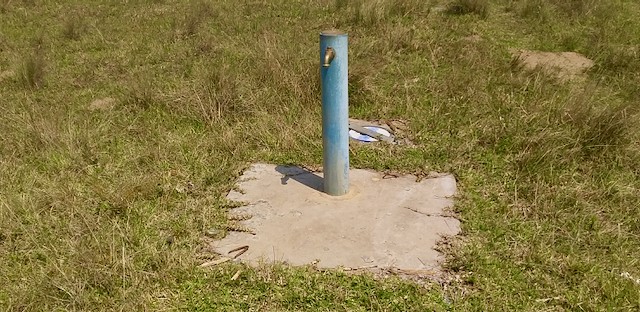Almost R254 million and 10 years later, still no water in villages
Taps of 17 villages in Matatiele, Eastern Cape, have never seen water
Taps are dry in 17 Matatiele villages despite hundreds of millions spent on water projects. The taps are just ornaments, says Thabang Moloi, of Manzi village. Photo: Nombulelo Damba-Hendrik.
- R254 million was allocated to two water projects to supply 17 villages.
- Ten years later there is still no sign of water in their taps.
- Villagers say one project was abandoned in 2015 and another in 2016.
- Municipal spokesperson says a pipeline kept bursting during testing.
Though R254 million was allocated for two projects to provide water for 17 villages in Matatiele, Eastern Cape, there is still no water in the village taps.
In one project, a multi-million rand tender to install water for nine villages was awarded to six contractors in 2010. Ten years and R88 million later, taps are still dry in eight of the villages.
The only village that has clean water uses a borehole which was not part of the project.
Alfred Nzo District Municipality spokesperson Lixolile Petela said the Fobane water scheme was designed in two phases. Just under R88 million was spent on phase 1, and a tender of R37 million was awarded for phase 2 to JAMJO Civils in 2014.
The villages that are supposed to benefit from this project are Fobane, Mangolong, Sekgotlong, Bethersda, Thafa, Good Hope, Linotsing, Matolong and Pholile.
But residents say JAMJO abandoned the site in 2015.
In Pholile, villagers fetch water from a river two kilometres away. “We normally come here in the morning at 4am,” says 16-year-old Leboh Moloedi who has the chore of fetching water as she lives with her 74-year-old grandmother and is the eldest of three siblings.
“As you can see we are sharing water with animals [cows] and this is not healthy, but we do not have a choice,” she says.
She says the village did not receive a water tank during the Covid-19 lockdown, but she saw on television that other villages had received tanks.
Moloedi says the 20-litre bucket she uses is heavy for her. “At least I will only come twice today. We are trying by all means to save water because this place is far,” she says.
Margaret Morhele, who was born in Pholile and is now 42, told GroundUp: “We have never had clean water. To us this water is ‘clean’ since we only have this source … Someone like you will never drink this water.”
In the other water project, the ward 7 water scheme, which started in October 2014 to supply water to eight villages over 60km away from Pholile, taps are still dry.
Petela said the phase 1A of this project was almost R37 million (awarded to LNP Construction) and is still under construction, although phase 1B, a R4-million tender awarded to Tswela Construction at the same time, is complete.
In November 2015, Phase 2 for R88 million was awarded also to LNP Construction and is still ongoing.
But villagers told GroundUp the contractor left the site in 2016.
The villages that are supposed to benefit from this project are Pote, Manzi, Sifolweni, Hillside, Lufefeni, Ngcwengane, Gingqizugodo and Mngeni.
Petela said delays were caused because the pipelines kept bursting during tests. He said the municipality is exploring available springs in ward 7 as an alternative source.
Thabang Moloi, of Manzi village, said, “People are suffering. We have old people who cannot go to the river, who are now forced to pay people to fetch them water.”
He said the taps that were installed are “ornaments”.
Wonga Potwana, DA leader in Matatiele, said construction at Fobane scheme stopped five years ago.
“What I can tell you is that a transformer was bought a year ago to pump water from Tinarha and it has not been installed and we do not know the reasons,” he said.
“What we are seeing are millions being injected into failing projects,” he said.
Support independent journalism
Donate using Payfast

Don't miss out on the latest news
We respect your privacy, and promise we won't spam you.
Next: West Coast mining magnate fails to keep criminal trial secret
Previous: Survey reveals learners go hungry
© 2020 GroundUp. This article is licensed under a Creative Commons Attribution-NoDerivatives 4.0 International License.
You may republish this article, so long as you credit the authors and GroundUp, and do not change the text. Please include a link back to the original article.

